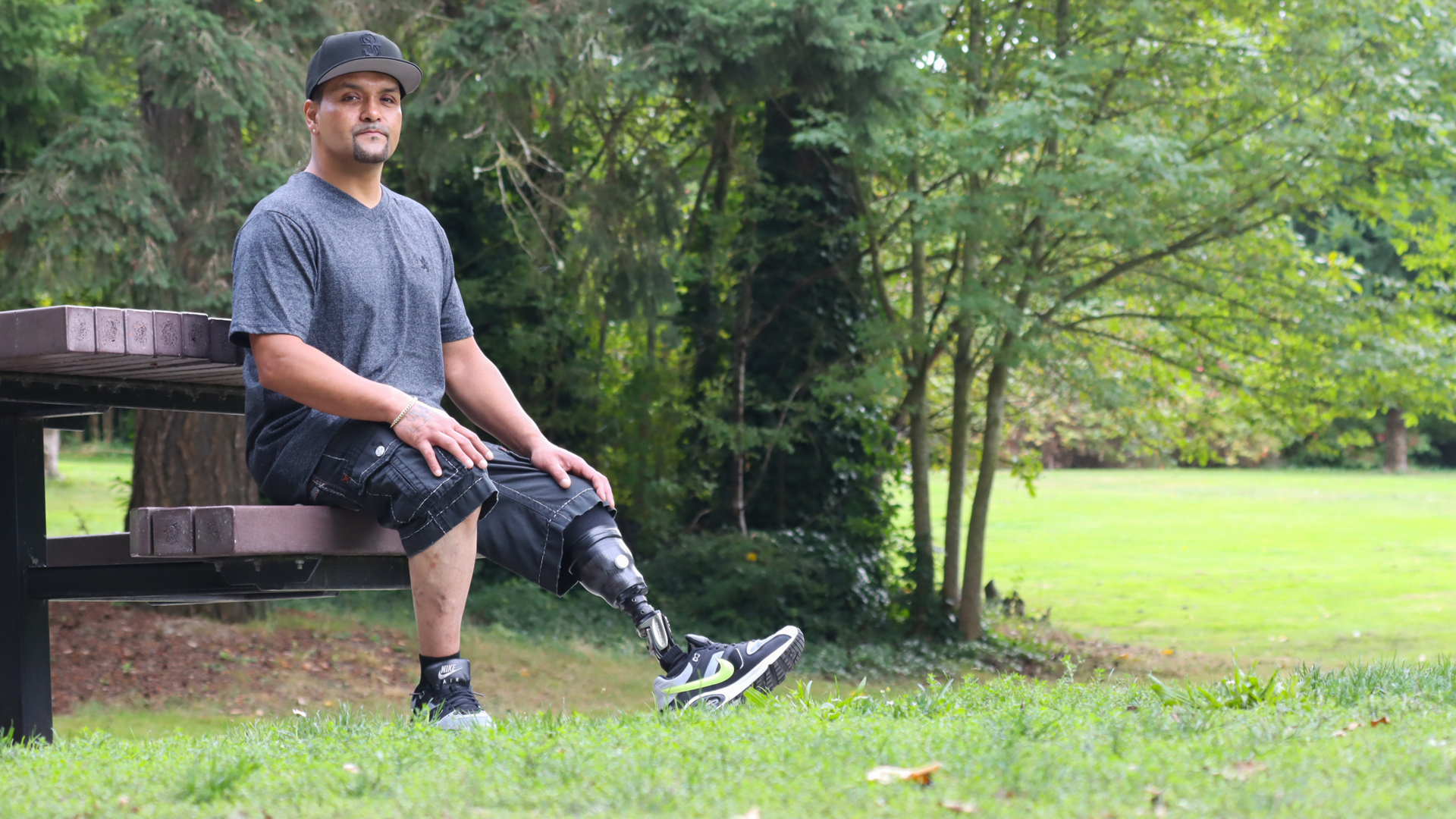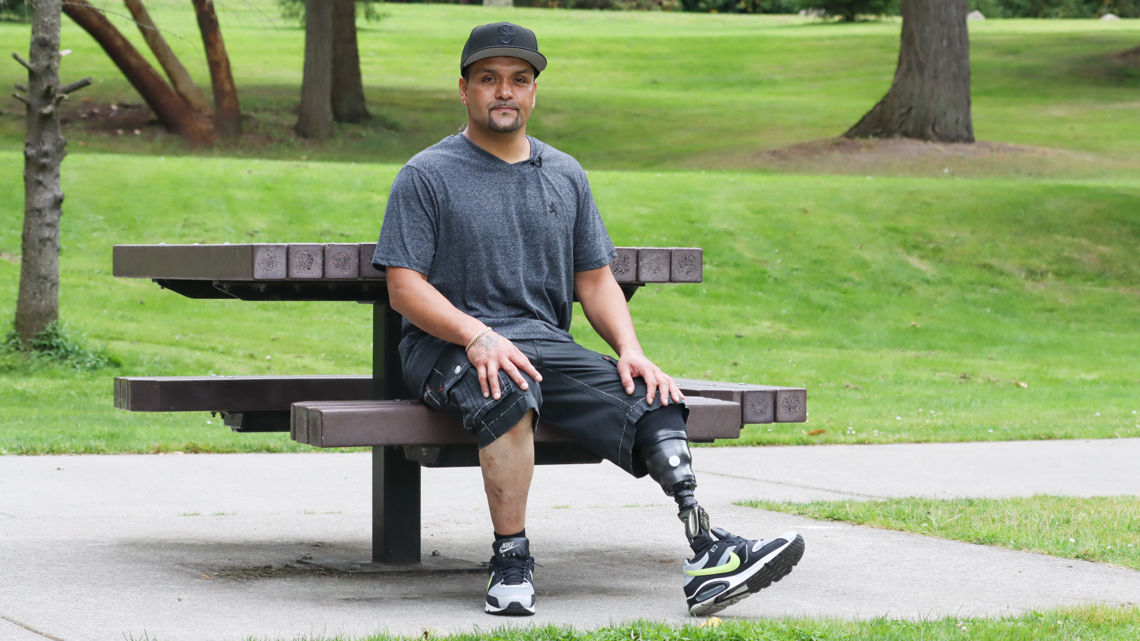Care from medical staff who lack training, authority puts WA inmates at risk of injury, death, KING 5 investigation finds
In multiple WA jails, low-level nurses who aren't qualified are making important medical decisions. Inmates and their families say it's led to injuries and deaths.

'They could have caught it'
Javier Tapia’s mental state was so diminished, he didn’t realize his toes had turned black at the Pierce County Jail in 2018. It wasn’t a nurse or doctor who noticed. It was a jail guard.
After developing a life-threatening infection from a blood clot in his foot, his five-month stay at the Pierce County Jail culminated with an injury that forever changed his life: the amputation of his left leg.
Hospital records show the infection likely had been festering for weeks, as Tapia's mental and physical health took a turn for the worst in jail.
But despite documented concerns from corrections and mental health staff that something was wrong, jail records show the facility didn’t send Tapia to a medical provider with the qualifications to diagnose the problem until it was too late.
“If I would have gotten the proper medical assessment, I’d still have my limb. They could have caught it,” said Tapia, 42, of Tacoma. “I was mistreated. It shouldn’t have happened to me, and it shouldn’t happen to anyone else.”
Incarcerated individuals are the only group of people in the country with the constitutional right to adequate healthcare. But a KING 5 investigation found in multiple jails across Washington state, low-level nurses who lack the qualifications and legal authority to assess patients are making pivotal medical decisions about inmates. Government, medical and federal court records claim the practice has led to life-altering injuries and unnecessary inmate deaths.


“The patients we see in our jails are the sickest patients in our community – the most complicated patients in our community,” said Dr. Marc Stern, the former assistant secretary for healthcare at the Washington State Department of Corrections. “It requires an analysis and an evaluation of the highest level of skill and training, which would be a physician or a mid-level practitioner.”
Stern, who is now a correctional healthcare consultant helping jails and prisons improve their medical practices, said he’s seen licensed practical nurses (LPNs) working outside of their scope of practice dozens of times in Washington jails.
“It’s egregious because it’s illegal, it’s unsafe, and we would not tolerate it if that’s the care we got at our doctor’s office,” he said.
Unlike registered nurses (RNs), who typically have about four years of schooling, LPNs have one to two years. LPNs are supposed to perform basic medical tasks, like checking vital signs, giving patients medications, and carrying out treatment plans ordered by an RN or doctor. State law mandates that they work under the direction and supervision of a higher-level provider. They are not allowed to make medical decisions by themselves, and they can't diagnose patients or decide how to treat them.
“They’re not qualified to do it," Stern said. "We run a high risk that they’re going to come to the wrong conclusion, that they’re going to miss something, and as a result, a patient could get sicker or die."
'Corners were being cut'
One of the companies at the center of the controversy in multiple Washington jails is a private, for-profit contractor called NaphCare. The Alabama-based company contracts with hundreds of correctional facilities across the country to deliver medical care for inmates in 49 states. It currently runs the medical units inside seven Washington county jails, including the Pierce County Jail, where Tapia's medical crisis began.
KING 5 found NaphCare has a history of allowing LPNs to work outside their scope of practice, according to a review of jail audits, federal lawsuits, inmate medical records and interviews with former NaphCare employees. Reporters uncovered cases in Pierce, Lewis and Kitsap counties, where independent experts raised concerns about the company’s practice of relying on the low-level nurses to provide complex care.
Bridget Stixrood, a former NaphCare employee who worked for three years as an RN at the Pierce County Jail, said she felt uncomfortable from her first day on the job.
“There weren’t a lot of checks and balances. LPNs had to do work that an RN probably should be doing, and NaphCare really was expanding the scope of practice of an LPN outside of what they legally were supposed to do,” she said. “It felt unsafe.”
In a recruitment video posted on NaphCare’s website, the company seems to brag about the autonomy of its LPNs, as featured employees discuss their “independence” and ability to do more than an LPN’s typical job description.
Stixrood said at the Pierce County Jail, NaphCare pressured LPNs to assess patients with complex problems, and they sometimes served as gatekeepers – deciding which inmates were sick enough to see a doctor.
“It made me feel like there were corners being cut because LPNs were cheaper,” said Stixrood, who is now a nurse practitioner in Seattle. “If you feel like harm is happening, it’s morally distressing. And that’s how I felt there – that people weren’t getting the care they needed."
NaphCare and the Pierce County Jail declined an interview for this story,.
Kristin Deuber, a NaphCare spokesperson, wrote in a statement that the company’s practices and policies comply with all local, state and federal laws.
“In each facility, we ensure that our staffing approach not only meets but exceeds the requirements necessary to support the health and well-being of the people entrusted to our care,” Deuber wrote. “All NaphCare staff providing medical, dental or mental health care are required to meet and follow state licensure and/or certification requirements."
Tapia's medical crisis
Tapia’s medical crisis began at the same jail where Stixrood saw problems.
He was booked into the Pierce County Jail in June 2018 after he stole a car. It was three months into his stint when Pierce County corrections staff noticed a sudden and unsettling change in his behavior.
In jail behavior logs, staff noted Tapia began showing “disturbing mannerisms” and was “way off baseline.” They documented he was “confused,” “unable to verbally respond,” “decompensated” and was refusing meals.
"The infection just diminished my my mental capacity to communicate. I have no explanation for it," he said. "It is a blur."
A mental health provider who evaluated Tapia at the beginning of his two-week decline suggested he could have an “unknown medical condition.” But instead of sending a registered nurse or a doctor, the Pierce County Jail sent an LPN to assess him.
The LPN concluded Tapia wasn’t in distress and there wasn’t a medical concern, according to the nurse's log of the interaction. A KING 5 review of Tapia’s medical file from the Pierce County Jail found no record of that LPN consulting with a doctor or medical provider with more training.
“That's just a perfect example of things getting missed because the right person wasn't assessing them and demanding to get into the cell and see what's going on,” said Stixrood, who had no involvement in Tapia’s treatment.
Tapia did not see another medical provider for 10 days, according to jail records.
A Pierce County Jail doctor weighed in on the same day the jail guard spotted Tapia's black toes. He sent the inmate to the hospital, where Tapia was informed of his fate.
“I had to have the surgery. If I didn’t, they said it was life-threatening. How could this happen?” Tapia said. "It's hard to cope with."


Problems across the state
KING 5 found documented problems with NaphCare’s practices not just in Pierce County, but across the state.
At the Kitsap County Jail, where NaphCare provides medical care, a 2022 audit raised concerns about jail protocols that allowed LPNs to assess patients and create treatment plans.
Kitsap County and NaphCare are also defendants in a federal lawsuit that alleges the jail's reliance on LPNs instead of more experienced providers contributed to the 2020 suicide death of inmate, Nick Rapp. The Kitsap County Sheriff's Office, which manages the jail, declined an interview request. In legal filings, the county and NaphCare deny the allegations.
In Spokane County, a jury levied a nearly $27 million verdict against NaphCare in 2022 after a federal lawsuit argued Cindy Hill's jail death could have been avoided with proper medical care.
At the Lewis County Jail, after Matthew Potter died from a heart attack in 2022, a fatality review found if a more experienced provider would have assessed him when he sought medical help for back pain and trouble breathing, the inmate's life may have been saved.
"The absence of higher level healthcare providers is a constant struggle in rural areas across the United States," the fatality review noted. "Add on the extra difficulty of recruiting in corrections, and it’s no wonder that an LPN is performing the jobs of RNs, (nurse practitioners, physician assistants), and physicians."
An independent doctor on the review panel recommended that the Lewis County Jail change its practices by hiring only RNs and nurse practitioners to deliver medical care at the facility. But at the conclusion of the fatality review, a NaphCare leader determined its LPN followed procedures, and the company had no plans to change its practices.
"That's what upsets me," said Lucas Potter, Matthew's brother. "They think they did everything right, and they have no plans of changing it."
Chief Chris Sweet, who runs the Lewis County Sheriff's Office Corrections Bureau, said even when the jail's LPNs work alone, NaphCare provides them with resources to get in touch with an off-site provider for approval before making medical decisions.
"I don't necessarily have a concern... I'm relying on those medical experts," he said.
Sweet said NaphCare has provided exceptional medical care in their facility during their seven years of contracting with the company, and NaphCare nurses have repeatedly saved the lives of Lewis County inmates.
"NaphCare has really mitigated liability for us. We have multiple examples of them and their professionalism, and the way they have cared for inmates," he said.
Stern, the correctional healthcare consultant, has raised concerns about NaphCare's practices in audits and reviews. But he emphasized the problem is not isolated to the company.
"I definitely see it with other private vendors — other companies that provide healthcare," he said. "The root cause is funding...It's a matter of providing enough funding to have an adequate number of staff, adequately trained staff, and of the right credential."
'They still took some of my freedom from me'
After his release from prison in January 2022, Javier Tapia said he's cleaned up his act. He landed a stable job, and with the support of his family, he said he's stayed clean and sober for more than six years.
But for everything going well in his life as a free man, this wasn't the life out of prison he pictured.
"I feel like they still took some of my freedom from me, leaving me in this state," he said. "Being an amputee now? It's challenging."
Tapia is now suing Pierce County and NaphCare in federal court.
"I just want the right people to be accountable for what happened to me," Tapia said.
The lawsuit claims Tapia's leg amputation could have been prevented. It accuses NaphCare and Pierce County of "callously" disregarding the risk to Tapia's health when they became aware of his "serious medical needs." It also claims NaphCare "purposefully insufficiently maintained staffing levels" at the Pierce County Jail to prioritize putting profit over care.
Pierce County and NaphCare deny the allegations in Tapia's lawsuit.
Court records show a NaphCare leader commended the jail's medical team for the quality of Tapia's care. In a June 2020 email to the Pierce County Jail nurses who evaluated him, NaphCare Medical Director Dr. Elliot Wade said the nurses helped to establish Tapia was seen and taken seriously.
"So thanks to you, he's alive. He's mad about his below the knee amputation, but in my opinion you did everything right and he's lucky," Wade wrote.
"They’re saying that they saved my life, but it shouldn’t have had to go that extent,” Tapia said. “For one to lose a limb? And they get recognition for what a great job they did – when they lacked on their diagnosis of me? I could have got the proper treatment.”

